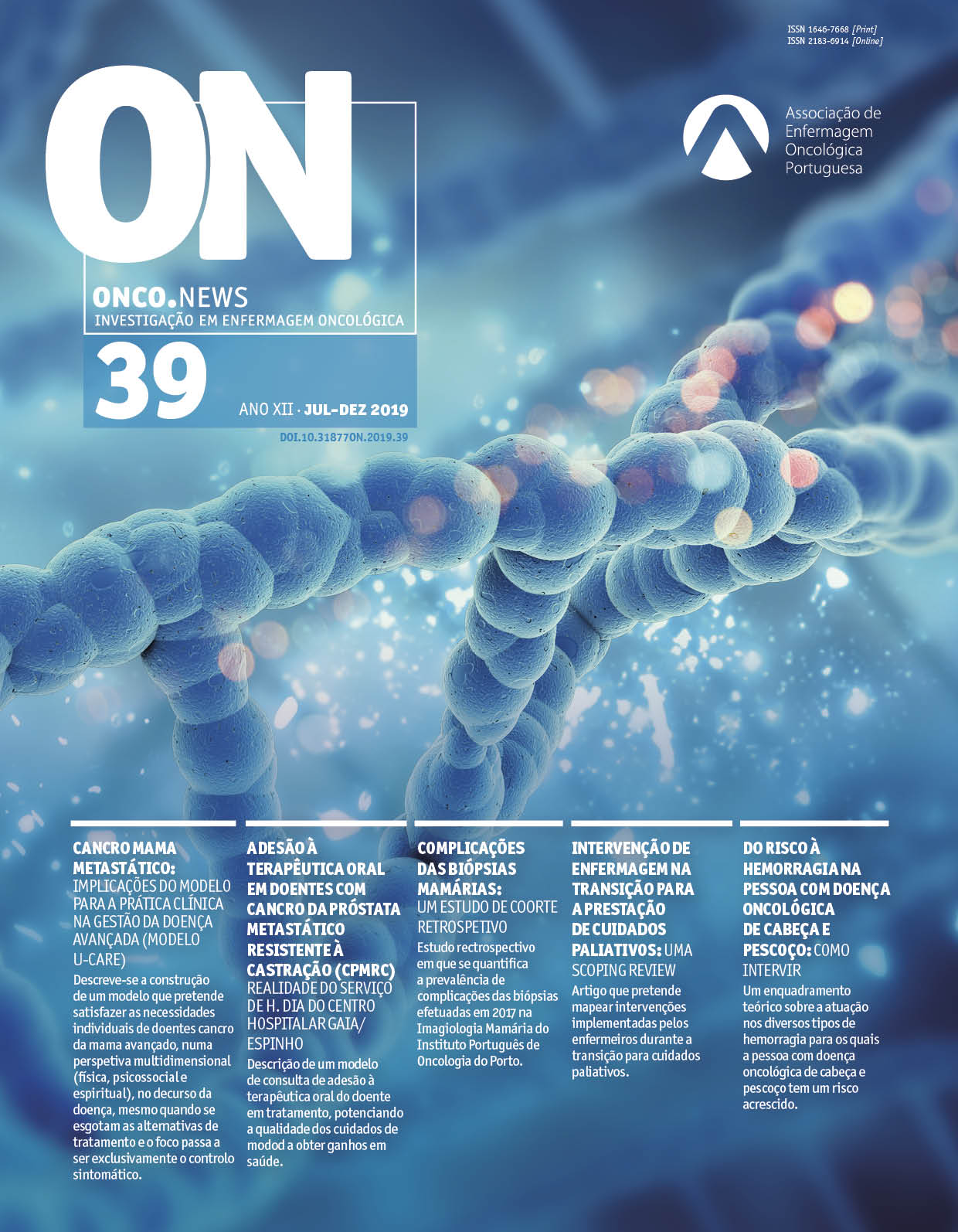Adherence to oral therapeutic in patients with castrate-resistant metastatic prostate cancer – Centro Hospitalar Gaia/Espinho Day Care reality
Keywords:
Adherence, Motivation, Empowerment, Oral antineoplastic therapyAbstract
Medication adherence is vital to the success of the treatment plan, being the priority of healthcare professionals to reduce the weak links that lead to medication errors and severe damage that they can cause.
Based on the European profile of patients with castrate-resistant metastatic prostate cancer, the population under oral antineoplastic therapy for this pathology at Centro Hospitalar de Vila Nova de Gaia/Espinho (CHVNG/E) during the year 2017 was characterized. In order to respond to the specific needs of this patient group, we proposed a model of adherence consultation.
It is our opinion that the promotion and monitoring of the compliance must be operationalized by professionals with specialized training and motivated for this subject. The adherence consultation model is patient centric, being essential its empowerment and motivation for the therapeutic plan. With this approach we intend to enhance the quality of care and achieve health gains.
Downloads
References
Barbosa, C.D., Balp, M.M., Kulich, K., Germain, N., Rofail, D. (2012). A literature review to explore the link between treatment, satisfaction and adherence, compliance and persistence. Dove Press Journal - Patient Preference and Adherence 6: 39–48.
Gold, D.T., McClung, B. (2006). Approaches to Patient Education: Emphasizing the Long-Term Value of Compliance and Persistence. The American Journal of Medicine (119):32-37.
Hirst, C.J., Cabrera, C., Kirby, M. (2012) Epidemiology of castration resistant prostate cancer: a longitudinal analysis using a UK primary care database. Cancer Epidemiology (36) e349–e353.
Kelly, D. (2017) Patient-Centric cancer care with oral chemotherapy - a quiet revolution is taking place,
[em linha] [acedido em 30/03/2018]: https://www.friendsofeurope.org/.
Porteous, T., Francis, J., Bond, C., Hannaford, P. (2010) Temporal stability of beliefs about medicines: implications for optimising adherence. Patient Education and Counseling, 79: 225-230.
Rivera-Sárate, S., González-Cordero, M.L., GutiérrezCollazo, L.M., Ríos-Motta, R. (2009). Knowledge,
compliance and satisfaction: an evaluation of a simple program. The consultant pharmacist, (24) 11: 823-831.
Sternberg, C.N., Baskin-Bey, E.S., Watson, M., Worsfold, A., Rider, A., Tombal, B. (2013) Treatment patterns and characteristics of European patients with castrationresistant prostate cancer. BMC Urology 13-58.
Timmers, L., Boons, C.C., Kropff, F., van de Ven, P.M., Swart, E.L., Smit, E.F.,… (2014). Adherence and patients’ experiences with the use of oral anticancer agents. Acta Oncologica 53: 259–267.
WHO. (2003) Adherence to long-term therapies – evidence for action.
Winkeljohn, Debra (2010). Adherence to Oral Cancer Therapies: Nursing Interventions. Clinical Journal of Oncology Nursing, (14) 4: 461-466.
Zerillo, J.A., Goldenberg, B.A., Kotecha, R.R., Tewari, A.K., Jacobson, J.O., Krzyzanowska, M.K. JAMA Oncology, [em linha] [acedido em 07/11/2017]: https://psnet.ahrq.gov/resources/resource/31211/Interventions-to-improve-oralchemotherapy-safety-and-quality-a-systematic-review.
Downloads
Published
How to Cite
Issue
Section
License
Copyright (c) 2019 Joana Fernandes Silva , Sandra Custódio, João Fraga

This work is licensed under a Creative Commons Attribution-NonCommercial-ShareAlike 4.0 International License.




